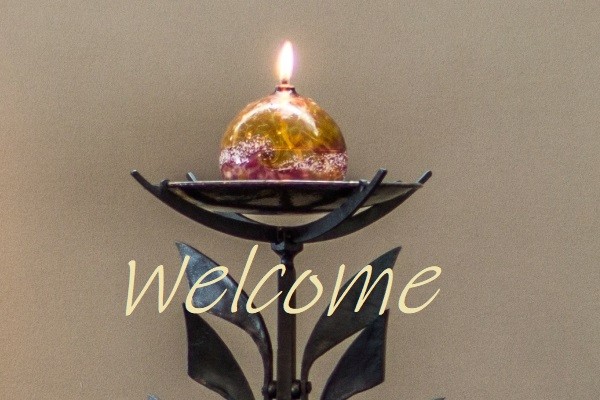WELCOME!
... To a faith with the power to transform lives and change the world. ... To a faith that can sustain and enrich the next chapter of your life.
Highlighted Events
Denominational Connections Team
|
|
|
 |
|
All are welcome to DCT meetings, which occur the first Tuesday of the month at 7 pm. For more information, contact the DCT co-chairs, Laura Bollettino and Kathy McLean, at This email address is being protected from spambots. You need JavaScript enabled to view it.
Other links of interest
UU World
Standing on the Side of Love
Mission Statement of the Denominational Connections Team (DCT)
The Denominational Connections Team (DCT) serves as a conduit for the exchange of information between the First Unitarian Universalist Congregation of Ann Arbor (UUAA) and the wider Unitarian Universalist (UU) community, providing our congregation and the denomination with a vibrant means of co-operating together and strengthening our identity as UU's. • We encourage congregants to attend UU gatherings at the state, district, region, and national level, including General Assembly. |
Recommended Books About Unitarian Universalism
1. A Chosen Faith: An Introduction to Unitarian Universalism, John A. Buehrens and Forrest Church, 1998, Beacon Press
2. The Unitarians and the Universalists, David Robinson
3. Being Liberal in an Illiberal Age, Jack Mendelsohn, 1995 Edition
4. Challenge of a Liberal Faith, George Marshall, Third Edition, 1991
5. Three Prophets of Religious Liberalism: Channing, Emerson, Parker; by Conrad Wright, 1986
For more suggestions or to browse a bit, visit our book store in the Social Hall following Sunday services.
Or purchase books from the UUA Bookstore online.
Prefer to order from Amazon?![]()
If you click here, the congregation will receive a small percentage of your purchase
Famous Unitarian Universalists
Some well-known UUs include:
Ralph Waldo Emerson
Clara Barton
John and Abigail Adams
John Quincy Adams
Susan B. Anthony
Pete Seeger
P.T. Barnum
Kurt Vonnegut
Louisa May Alcott
Isaac Newton
Eliot Richardson
Whitney Young
William Howard Taft
For more about these and other famous UUs, check the list in Wikipedia.
Or read more about UU history on the UUA (Unitarian Universalist Association) site.
Our Chalice Symbol
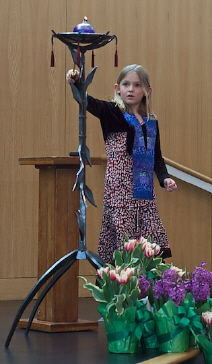 A chalice lighting begins our service
A chalice lighting begins our service
When we gather for services on Sunday mornings we begin by lighting a hand-crafted chalice to unite us in worship and symbolize the spirit of our community. For Unitarian Universalists, the flaming chalice represents a rich mixture of symbols, including the light of truth, the fire of compassion and commitment and the warm embrace of community.
Historically, the chalice has always been an important symbol of our denomination’s commitment to social justice. The first Flaming Chalice symbol was designed in 1941 by an Austrian artist, Hans Deutsch. It was created to serve as a recognizable symbol to identify members of the Unitarian Service Committee who were assisting Eastern Europeans fleeing from Nazi persecution. (You can read more in The Healing Cup: The Story of the Flaming Chalice, by Noreen Kimball)
We say these words in unison when we light our chalice:
We light this chalice for the light of truth;
We light this chalice for the warmth of love;
We light this chalice for the energy of action;
We light this chalice for the harmony of peace.
Logos
 First Unitarian Universalist Congregation of Ann Arbor
First Unitarian Universalist Congregation of Ann Arbor Unitarian Universalist Association
Unitarian Universalist Association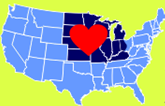 Mid America Region
Mid America Region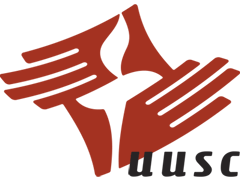 Unitarian Universalist Service Committee
Unitarian Universalist Service Committee
Regional and National UU Connections
![]()
![]() Looking for ways to link up with other UU's through Social Networking? Follow this link to find out how.
Looking for ways to link up with other UU's through Social Networking? Follow this link to find out how.
Show off your UU identity with UU jewelry
The UUA Bookstore and several other vendors have UU jewelry that can be ordered. Our congregation does not make money on these sales. The links below are provided for your convenience.

We are a member of the Unitarian Universalist Association (UUA)
 Unlike many denominations, Unitarian Universalists are democratically-run congregations. Our national organization, the Unitarian Universalist Association of Congregations, does not assign ministers or give directives to congregations. It serves as an invaluable resource to member congregations. UUAA is a member of the Unitarian Universalist Association of Congregations (UUA) which represents the interests of more than one thousand Unitarian Universalist congregations, in North America. The UUA grew out of the 1961 consolidation of two religious denominations: the Universalists, organized in 1793, and the Unitarians, organized in 1825. For more information, visit the UUA web site.
Unlike many denominations, Unitarian Universalists are democratically-run congregations. Our national organization, the Unitarian Universalist Association of Congregations, does not assign ministers or give directives to congregations. It serves as an invaluable resource to member congregations. UUAA is a member of the Unitarian Universalist Association of Congregations (UUA) which represents the interests of more than one thousand Unitarian Universalist congregations, in North America. The UUA grew out of the 1961 consolidation of two religious denominations: the Universalists, organized in 1793, and the Unitarians, organized in 1825. For more information, visit the UUA web site.
Unitarian Universalist Association General Assembly
Every year in June, our congregation sends delegates to the UUA's General Assembly meeting to vote on issues, attend workshops and learn and worship together with UUs from all over the country.
June 24-28, 2020 Providence, RI
June 23–27, 2021 Milwaukee, WI
June 22-26, 2022 Portland, OR
June 21-25, 2023 Pittsburgh, PA
Unitarian Universalist Service Committee
 The Unitarian Universalist Service Committee is an independent human rights organization. UUSC works to advance economic justice, promote environmental justice, defend civil liberties, and protect the rights of vulnerable people in humanitarian crises.
The Unitarian Universalist Service Committee is an independent human rights organization. UUSC works to advance economic justice, promote environmental justice, defend civil liberties, and protect the rights of vulnerable people in humanitarian crises.
Our work is grounded in UU principles and made possible by the activism and generous support of our 47,000 members. At First UUAA we have about 130 UUSC members. All the work we do in the United States and around the world relies on the support of memberships which begin at $10. For youth $20. For seniors $40. Regular and $75. For dual regular. UUSC is an Associate member of the UUA, but receives no funds from them. In addition to the annual " Guest at Your Table" fund raiser, UUSC makes special appeals in event of disasters like the recent Kenya Crisis, Darfur and the Gulf Coast Hurricane. For more information, visit the UUSC web site.
Young Religious Unitarian Universalists (YRUU)
 Our youth between the ages of 14 and 20 have opportunity to participate in programs organized by the Young Religious Unitarian Universalists, a separate group sponsored by the UUA.
Our youth between the ages of 14 and 20 have opportunity to participate in programs organized by the Young Religious Unitarian Universalists, a separate group sponsored by the UUA.
MidAmerica Region
![]()
In June, 2013, our Heartland UU District became a part of the larger MidAmerica Region. Follow the link to read the regional newsletter and learn more about the resources they provide.
 The UU United Nations Office
The UU United Nations Office
The Unitarian Universalist United Nations office (UU-UNO) recently celebrated 50 years of service. You can learn more by visiting the UUA web site.
Our Denominational Connections Team
What UUs Believe
Great teachers of many faiths have stressed the worth and dignity of the human spirit, the relatedness of all peoples, and the importance of ethical behavior. These are core values for the UU religious movement.
While our religious roots are Judeo-Christian, today's Unitarian Universalists encompass a large spectrum of faith perspectives including: Atheist/Agnostic, Buddhist, Christian, Hindu, Humanist, Jewish, Muslim, Pagan, and more.
Take a few minutes to watch this video about our diverse beliefs and shared values. The video was produced by the Unitarian Universalist Association (UUA), our national support organization.
UU congregations do not have a creed, but we affirm these seven principles
- 1st Principle: The inherent worth and dignity of every person;
- 2nd Principle: Justice, equity and compassion in human relations;
- 3rd Principle: Acceptance of one another and encouragement to spiritual growth in our congregations;
- 4th Principle: A free and responsible search for truth and meaning;
- 5th Principle: The right of conscience and the use of the democratic process within our congregations and in society at large;
- 6th Principle: The goal of world community with peace, liberty, and justice for all;
- 7th Principle: Respect for the interdependent web of all existence of which we are a part.
The seven Principles and six Sources (see below) of the Unitarian Universalist Association grew out of the grassroots of our communities, were affirmed democratically, and are part of who we are.
Although we uphold shared principles, individual Unitarian Universalists have varied beliefs about everything from scripture to rituals to God. We uphold a free search for truth and find that search more meaningful when shared in community.
Our religious perspectives draw from many sources. The "Six Sources" we cite are:
UUs strive to listen, learn and grow from teachings that come from many diverse sources, including:
- Direct experience of transcending mystery and wonder, affirmed in all cultures, which moves us to a renewal of the spirit and an openness to the forces which create and uphold life;
- Words and deeds of prophetic people which challenge us to confront powers and structures of evil with justice, compassion, and the transforming power of love;
- Wisdom from the world's religions which inspires us in our ethical and spiritual life;
- Jewish and Christian teachings which call us to respond to God's love by loving our neighbors as ourselves;
- Humanist teachings which counsel us to focus on this life and how to ethically treat others, to heed the guidance of reason and science, and warn us against idolatries of the mind and spirit;
- Spiritual teachings of earth-centered traditions which celebrate the sacred circle of life and instruct us to live in harmony with the rhythms of nature;

History of Unitarian Universalism
Unitarian Universalism is a non-creedal religion that is over 400 years old. Our religious roots are grounded in two controversial early Christian "heresies". The Unitarians denied the Trinity as being non-biblical, and the Universalists believed in universal salvation, as opposed to salvation of only the promised elect.
In the U.S., the Universalist Church of America was organized in 1793 and the American Unitarian Association organized in 1825. The two movements joined together in 1961. ( Read more on the web site for the Unitarian Universalist Association)
Browse a list of recommended books about Unitarian Universalism.
Famous Unitarians include John Adams, PT Barnum, Kurt Vonnegut and many more....

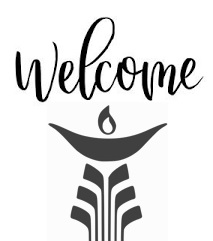 NEW TO UUAA?
NEW TO UUAA?